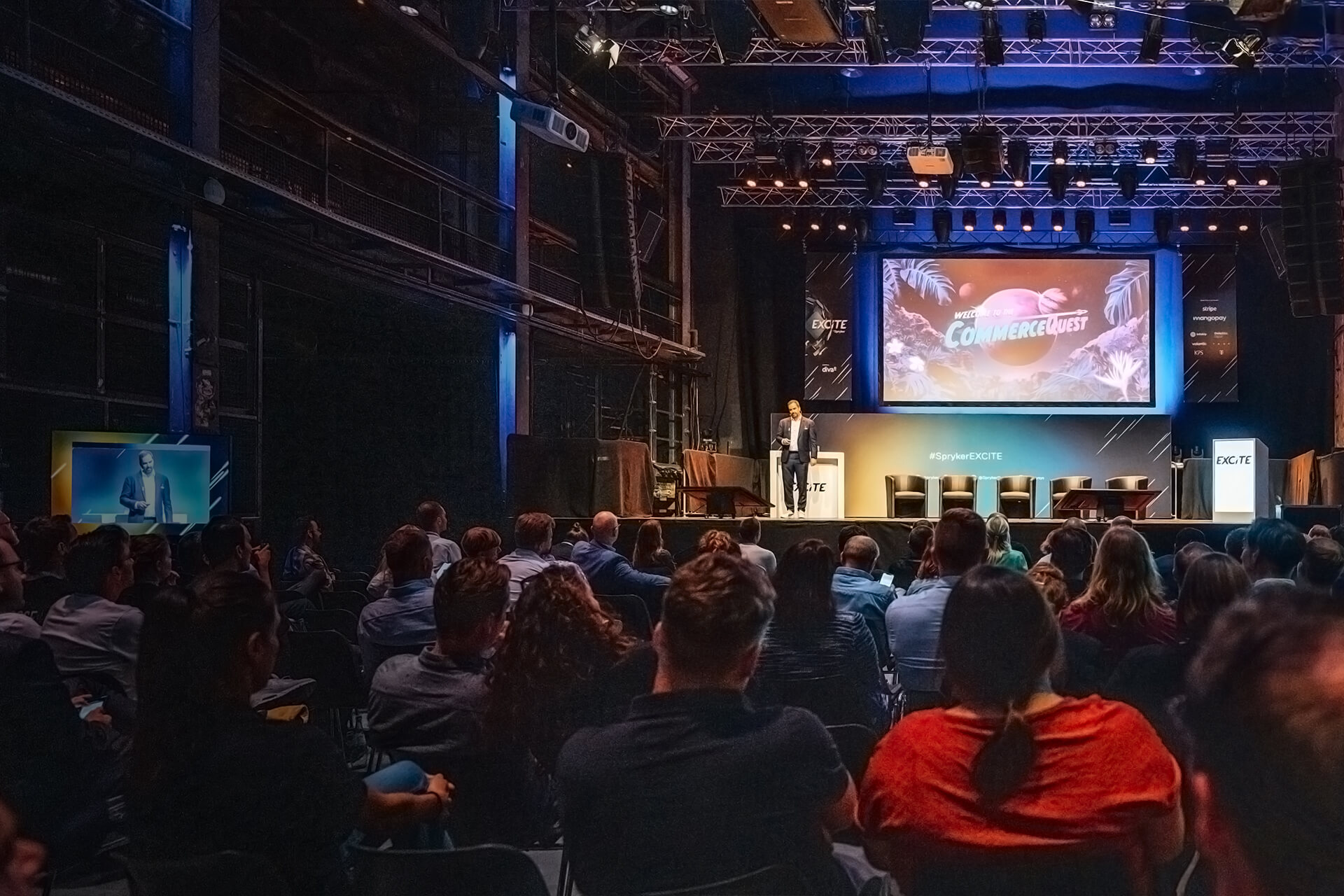AI
The Future of AI in B2B Digital Commerce
AI is a transformative force reshaping how B2B businesses sell, scale, and compete. Discover how composable architecture, agentic intelligence, and adaptive experiences are redefining what’s possible for AI-powered enterprises.


At Spryker, we don’t believe AI is just another layer in the tech stack. It’s the catalyst redefining the rules of engagement, speed, and scale in digital commerce, especially in B2B. As capabilities in generative and agentic AI accelerate, the line between what can be automated and what must be human-led is rapidly blurring.
The future of AI in B2B is not a hypothetical. It’s already reshaping how enterprises buy, sell, and grow. And for businesses that act now, the window for competitive advantage is wide open.
From Automation to Autonomous Decision-Making
The next chapter of B2B commerce isn’t about automating isolated tasks. It’s about enabling semi-autonomous systems that can make, execute, and optimize decisions at scale. Gartner predicts that by 2028, 15% of business decisions will be made autonomously or semi-autonomously by AI agents and 33% of enterprise software will incorporate agentic AI.
In a B2B context, that means systems that can:
- Negotiate supplier terms based on historical and real-time variables
- Adjust dynamic pricing models across geographies, segments, or inventory levels
- Recommend procurement actions and reorder points without human intervention
This shift is no longer futuristic. It’s fundamental. Leaders who enable intelligent decision loops today will outpace competitors on both speed and margin.
We’re seeing early-mover B2B companies use AI not to replace people, but to outmaneuver the market. The goal isn’t to automate everything. It’s to get smarter, faster, and more responsive where it matters most.
Building an AI-Ready Commerce Architecture
To get there, organizations must evolve beyond monolithic platforms and brittle legacy stacks. Deploying AI at scale requires a composable architecture: one that’s API-first, data-rich, and integration-ready.
AI doesn’t thrive in isolation. It requires:
- Unified access to operational data (PIM, ERP, CRM, OMS)
- Modular commerce layers that allow experimentation without disruption
- Tools that support reasoning, learning, and contextual memory
Spryker’s composable approach was designed with this future in mind. Whether enabling AI-driven storefront search, autonomous checkout workflows, or predictive product bundling, our architecture empowers teams to experiment, optimize, and scale—without being locked in.
The Rise of the AI-Augmented Workforce
AI won’t just change what gets done. It will redefine who does it, and how. According to Gartner, by 2028, 20% of digital workplace applications will use AI-driven personalization algorithms to generate adaptive experiences for the worker. Adaptive, AI-powered enablement will become the standard for onboarding, sales training, and continuous skill development.
In B2B, where complex products and extended sales cycles dominate, this will radically enhance team productivity and consistency. Sales reps, support agents, and solution engineers will be coached in real time, guided by intelligent copilots embedded into their workflows.
But there’s a catch.
Without intentional skill development, companies risk accumulating skill debt, which is a slow erosion of critical human capabilities like negotiation, abstract problem-solving, and strategic planning. Forward-looking leaders must embed human capital strategies alongside AI deployment, preserving the expertise that truly differentiates B2B businesses.
Rethinking Value: AI-Driven vs. Human-Led Differentiation
As AI becomes table stakes for operational efficiency, the real differentiators will emerge where humans outperform machines, in areas like consultative selling, strategic planning, and relationship-driven account management.
Transactional tasks, including quotes, reorders, inventory lookups, will be executed by AI faster and with more precision than any team can manage manually. But high-value services, deeply tailored solutions, and advisory interactions will command a premium when delivered by humans.
This is not an either/or equation. It’s a call to strategically divide labor between machine intelligence and human creativity. Smart B2B businesses will double down on customer experience, embedding AI where it drives velocity, and elevating human touchpoints where trust, nuance, and complexity matter.
Leading with AI, Winning with Agility
At Spryker, we’re helping our customers architect for this dual advantage. Our platform supports the integration of AI across the entire commerce stack, from intelligent search and personalized content to agentic process automation.
What’s clear is this: the future will reward businesses that don’t just deploy AI, but embrace and operationalize it. That means:
- Composable platforms built for rapid iteration
- AI-ready data ecosystems across the buyer journey
- A culture that embraces change without compromising human ingenuity
The B2B companies that win will be those who act with speed, precision, and purpose.
Final Word: The Future Isn’t Automated. It’s Intelligently Composed.
AI is not a threat to B2B commerce. It’s the single greatest multiplier of insight, scale, and responsiveness in a generation. But it’s also a test of vision and adaptability. Success won’t come from simply automating everything. It will come from reimagining everything: your systems, your teams, and your customer value.
At Spryker, we’re building the infrastructure that allows businesses to thrive in this AI-powered era. And we’re doing it in a way that’s agile, modular, and uniquely fit for the complexity of B2B.
Let’s shape the future of commerce – together.
Want to connect on the topic of AI with digital commerce leaders? Join us at Spryker’s flagship event, EXCITE 2025, on September 25 in Berlin.

Learn from other companies how they are turning uncertainty into competitive advantage at EXCITE 2025 taking place on September 25 in Berlin.
Join us at EXCITE- Spryker EXCITE


